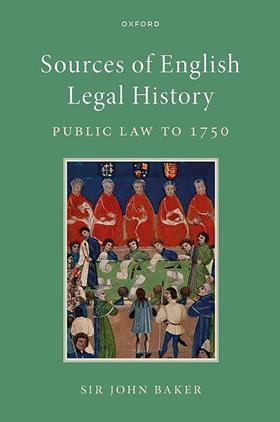Sources of English Legal History: Public Law to 1750
Sir John Baker
£150, Oxford University Press
★★★★✩
Legal history is important because it explains why we do things the way we do. It also confirms that many legal issues and challenges dealt with by lawyers over the centuries have not changed much. We still help people manage their money, buy and sell land, and assist when they get into trouble and have disputes with authority.
A theme that permeates this book is the development of ideas about the rule of law, due process and the rights of the individual against the state. This is a work of considerable scholarship, consisting of excerpts from law reports, legislation, charters and other documents which illustrate the way legal history has evolved.
Although the book is subtitled Public Law, many of the documents refer to individuals and their problems (usually with the state), set against a background of national events. These include the Crown and its dynastic struggles. All these incidents are interpreted and explained by the law. With regard to the abdication of Richard II, the king apparently gave up his throne ‘willingly’ and with a ‘cheerful countenance’.

The book also looks at the development of common law and the rights of parliament. These include the Ship Money cases in the 17th century, and the role of judges and courts. The Ship Money cases were challenges to King Charles’s decision to tax the middle classes without the authority of parliament. They galvanised legal opposition to arbitrary rule. A leading figure, John Hampden, lost his case but it was a key event in the history of democracy. Sir Edward Coke (pictured) described the case as the ‘greatest cause that ever came in question before any judges’.
This book also includes texts on tax, trade, commerce and crime. There are sections on the beginnings of local authority, and even bye-laws which go back at least to the beginning of the 16th century. Some cases challenged the power of local mayors to detain anyone they disagreed with.
Regrettably, the book does not contain much about attorneys. But in 1607 a Mr Bulthrope was locked up in the stocks by a churchwarden, merely for pleading the case of a client. He was given £100 compensation (about £25,000 in today’s values) for having been detained in the public view ‘in his velvet jacket’. He relied on Magna Carta, ‘that no free man be imprisoned’. Coke, writing ‘On the liberty of the subject’, describes ‘a free man imprisoned without cause… is not so much a man, but is indeed a dead man… Imprisonment is accounted in law a civil death; he loses his home, family, neighbours, country, and is to live among wretched and wicked men, malefactors and the like’.
This book is full of gems. Legislation was passed in 1362 saying that court pleadings had to be in English not French, though the act itself was written in Latin.
I wonder what the history books will say of our period. Will they include everyday heroes who represent clients?
David Pickup is a partner at Pickup & Scott Solicitors, Aylesbury































No comments yet